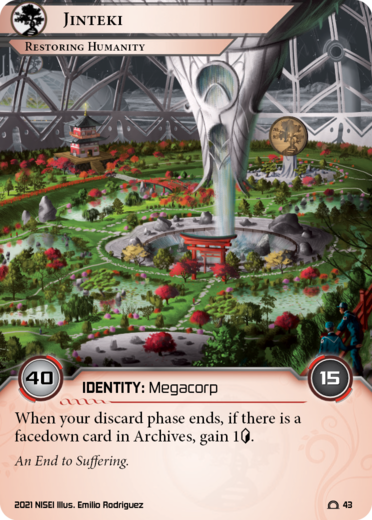A garden grows beneath the Moon’s surface. Stone paths wind between banyan trees and still ponds where carp dance under crystal water. A calm, peaceful place.
Jinteki’s Restoring Humanity is a healthcare division, studying the long-term effects of space on human bodies and developing therapies to assist lunar workers. Yet their forays onto the lunar surface are not as peaceful and pure as they seem. Beyond the groves and gardens, Jinteki has plans for the workers they treat; plans only a brave—or foolish—runner would seek to uncover…
Throughout the playtesting process, we wanted to create a Jinteki ID that interacted with Archives in a meaningful way, evoking the theming of Jinteki’s hidden plans. Achieving this was a tricky task; we strove to balance a benefit to the Corporation with a clear incentive for Runners to interact. The latter is an especially important lesson for players new to the game.
In my mind, the final version of Restoring Humanity does three things. Firstly, it forces Runners to make a decision on the value of running Archives in order to stop the Corp from gaining money. Since a successful run on Archives turns all cards in Archives face-up, a Runner can shut off Restoring Humanity’s credit drip with a single run… but is it really worth it? Secondly, it opens up design space for the future by encouraging designers and playtesters to think about how Archives fits into the game. Thirdly, it interacts in exciting ways with a whole host of cards, both old favourites and promising newcomers.
So, how to get cards into Archives? There are a number of existing Jinteki options, such as Hasty Relocation and Genotyping and, more excitingly, an array of new cards in System Gateway. Jinteki has the powerful Anoetic Void to throw the Runner into the abyss, plus the more sedate Hansei Review for economic value. You might well see players using Uprising’s Kakurenbo or importing NBN’s new Spin Doctor. All of these cards, one way or another, draw, discard or recycle, pushing you through your deck to find the key pieces and maximising the benefits of a 40-card ID.
Restoring Humanity is the second 40-card identity ever printed for Jinteki, and a smaller deck size means more consistency. A rush strategy utilising the new tools could turn out to be very powerful for competitive play. Tempo-positive agendas such as Cyberdex Sandbox, along with Jinteki’s cheap ice and cards such as Bio Vault could see you reaching 7 points before the Runner can stop you. Another option is to play six 3-point agendas and look towards a spiky, attrition-based glacier strategy, locking down Archives and your other servers in order to force a win.
Whichever direction you decide to take this ID, Runners won’t like what they find.
System Gateway and System Update 2021 will be released on or shortly after March 28, 2021, as physical cards via NISEI’s print-on-demand partners and pay-what-you want files for downloading and printing at home!

